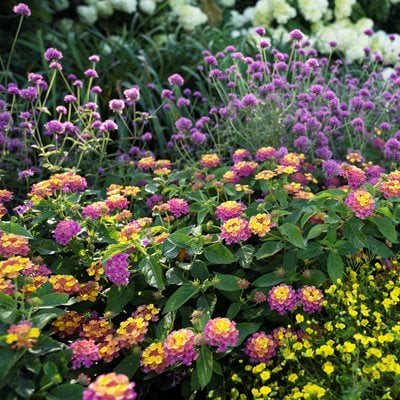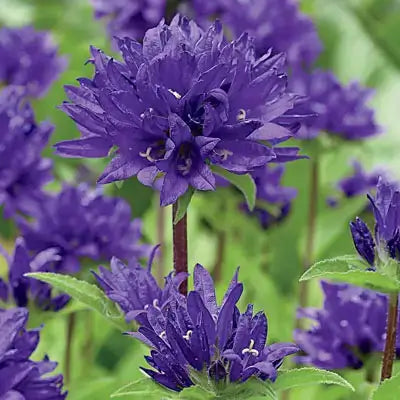Planting perennial plants is an excellent option if you're looking for a sustainable and eco-friendly way to enhance your garden or landscape. Not only do they offer a beautiful and colorful display, but they also provide several environmental benefits. Perennial plants have deep root systems that can help prevent soil erosion and improve soil quality, reducing the need for fertilizers and pesticides.
They also support a diverse range of wildlife, including bees and butterflies, which are crucial to pollination and the health of our ecosystem. Additionally, perennial plants require less water than annuals, making them a more sustainable choice for water conservation. Planting perennial plants is an excellent way to create a beautiful and sustainable garden while contributing to a healthier environment.

Environmental Benefits of Perennial Plants
Perennial plants are an excellent way to reduce the impact of climate change by sequestering carbon dioxide in the soil. The deep root systems of perennial plants help to store carbon in the soil, which helps to reduce carbon emissions in the atmosphere. Perennials also require less watering than annuals, reducing the water needed for irrigation. This is important because water scarcity is becoming a significant global issue. Planting perennials can conserve water and reduce the energy needed for irrigation.
Perennial Plants & Climate Change
Perennial plants are an excellent tool for mitigating the impacts of climate change. Perennial plants are highly effective at sequestering carbon dioxide in the soil. The carbon is then stored in the plant's roots, stems, and leaves, where it is held for many years. This helps in the reduction of greenhouse gas emissions and combatting climate change. Additionally, perennials require less energy and resources than annuals, reducing your garden's carbon footprint.
How Perennial Plants Improve Soil Health
Perennial plants have deep root systems that help to improve the quality of the soil. The roots of perennial plants can penetrate deep into the soil, helping to break up compacted soil and improve drainage. This allows water to penetrate the soil more efficiently, which reduces runoff and erosion. Perennials also help to build soil structure by adding organic matter to the soil. This improves soil fertility and reduces the need for synthetic fertilizers.

Perennial Plants & Wildlife Habitat
Perennial plants are an excellent tool for creating wildlife habitats. The deep root systems of perennials provide shelter and food for various wildlife, including birds, insects, and mammals. Perennials also provide a food source for pollinators which are essential for the health of our ecosystem. By planting perennials, you can help to create a diverse and healthy ecosystem in your garden.
Using Perennial Plants for Natural Pest Control
Perennial plants are an excellent tool for natural pest control. Many perennials, such as mosquitoes and aphids, contain natural compounds that repel pests. This reduces the need for synthetic pesticides, which can harm beneficial insects and pollinators. Additionally, many perennials attract predatory insects, such as ladybugs and lacewings, which help control harmful insect populations.
Perennial Plants for Water Conservation
Perennial plants require less water than annuals, making them an excellent choice for water conservation. The deep root systems of perennials allow them to access water deep below the soil surface, which reduces the need for frequent watering. Additionally, perennials are more drought-tolerant than annuals, which means they can survive long periods without water. By planting perennials, you can help to conserve water and reduce the environmental impact of your garden.
Types of Perennial Plants to Consider for Your Garden
There are many different types of perennial plants, each with unique benefits. Some popular perennial plants include coneflowers, black-eyed Susan's, and daylilies. These plants are easy to grow and need little maintenance, making them an excellent choice for novice gardeners. Other popular perennial plants include Hosta's, ferns, and ornamental grasses, which are excellent for adding texture and interest to your garden.
Tips for Planting Perennial Plants
When planting perennial plants, it's essential to choose the correct location. Perennials thrive in well-drained soil, so choosing a spot that doesn't retain water is essential. It's also important to plant perennials at the right time of year. Spring and fall are the best periods to plant perennials because the soil is moist and the temperatures are mild. Finally, it's essential to choose the right plants for your garden. Some perennials require full sun, while others prefer shade. Choosing the right plants for your garden ensures they thrive and have maximum environmental benefits.
Conclusion
Planting perennial plants is an excellent way to create a beautiful and sustainable garden while contributing to a healthier environment. Perennials offer several environmental benefits, including improved soil health, reduced water usage, and increased biodiversity. Planting perennials can help mitigate climate change's impacts and create a healthy ecosystem in your garden. With so many different types of perennials to choose from, there's something for every garden and every gardener. So why not switch to perennials today and start enjoying the benefits of a sustainable garden?


